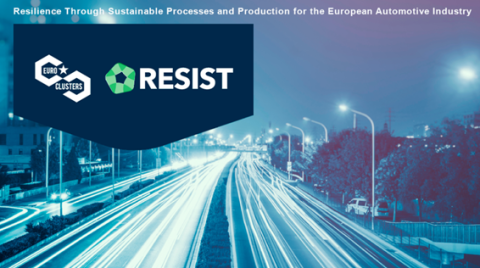
RESIST: Innovation projects Open Call

About this good practice
This practice addresses the need for more sustainable production tools in the MTA ecosystem. This need stems from the challenges of environmental impacts and the need for economic success and resilience to market changes and crises.
The context triggering this initiative is the broader goal of a green and digital transition within the MTA sector that focuses on reducing environmental impacts and increasing resilience.
The practice seeks to achieve its objectives by providing financial support to eligible businesses to implement innovation projects that involve improved technologies and processes in manufacturing with an emphasis on reducing environmental impacts.
The implementation includes two open calls for proposals that allow beneficiaries to submit proposals for innovative projects. These projects should focus on one of three key challenges: optimised digitalisation, greener production systems or products and renewable energy innovations in production lines.
The main stakeholders are the European Commission (which provides the funding mechanism) and the Eurocluster RESIST partners, which are the clusters that manage the programme.
The main beneficiaries are European SMEs, start-ups and mid-caps in the MTA ecosystem. They receive financial support to develop and implement their innovative projects with individual applicants receiving up to €20,000 and consortia up to €90,000.
Expert opinion
These calls for projects funded by the Single Market Programme address the pressing need for more sustainable production tools within the Mobility, Transport, and Automotive ecosystem, aligning with broader goals of green and digital transitions in the sector. The RESIST mechanism provides financial support to eligible businesses through open calls for proposals, focusing on critical challenges such as optimised digitalisation, greener production systems, and renewable energy innovations. The practice is very topical as in the context of the EU Green Deal and its significant push for a resource-efficient and competitive economy, digitalisation is also seen as a key enabler for achieving the core targets. The open calls provide interesting learning value for policy makers, then, from the perspective of how such twin transition SME support programmes can be set up via public calls. Especially illuminating are the challenges faced during its implementation, such as identifying critical challenges among SMEs, setting up a platform for submissions, and ensuring adequate financial support for external evaluators. This experience emphasises the importance of comprehensive planning, resource allocation, and proper funding mechanisms to overcome challenges and ensure the success and sustainability of similar initiatives. See also the recent webinar “Twin transition for SMEs”: https://www.interregeurope.eu/find-policy-solutions/webinar/twin-transition-for-smes-key-learnings
Resources needed
The RESIST is funded with a total of €1.4 million from the SMP (Single Market Program) calls as a pilot project among 30 other funded Euroclusters from 14 different ecosystems.
Of this total funding, €1.05 million is specifically earmarked for open calls for SMEs.
Evidence of success
This Open Call is a prime example of fostering innovation in the MTA sector. Receiving 31 projects submissions, with 12 projects selected for funding, it highlights a strong interest in sustainable and digital solutions, particularly AI. Most projects address digitalization, aligning with the twin transition of green and digital advancements. As an ongoing initiative, its full impact is yet to unfold, but early signs point to a strategic and impactful contribution to the European MTA ecosystem.
Potential for learning or transfer
The biggest challenges in the RESIST project involved identifying key challenges among SMEs and establishing the open calls. Setting up a platform for application submissions was a significant hurdle, requiring careful planning and execution. Another major challenge was maintaining agreements with external evaluators. The lack of financial support for these evaluators was a notable issue, as the external evaluation is a critical component of the project. This absence of funding for evaluators is seen as a drawback, highlighting the importance of adequately resourcing all aspects of such initiatives, especially those involving critical evaluation processes. The experience underscores the need for comprehensive planning and resource allocation in similar projects.
Further information
Images
Website
Good practice owner
You can contact the good practice owner below for more detailed information.

